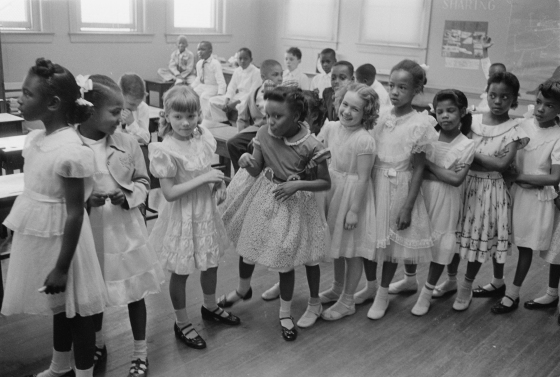Recently This American Life released two episodes surrounding Ferguson, Michael Brown, and integration within the American education system. Dr. Kamau Bobb examines the role of the business community in addressing challenges in public education. Despite the charged issues, the producers created the kind of episode worth listening to: prompting more questions, wondering where you might fit within progression for all sides.
At the heart of the episodes was the question of why American school districts gave up on the integration focus of the 70s and 80s. Test scores from these periods in history show quite clearly, integration worked. Why? How? A journalist interviewed as part of the episode had this to say:
“It is not that something magical happens when black kids sit in a classroom next to white kids. It’s not that suddenly a switch turns on and they get intelligence, or wanting the desire to learn when they’re with white kids. What integration does is it gets black kids in the same facilities as white kids. And therefore, it gets them access to the same things that those kids get—quality teachers and quality instruction.”
The most striking segment is found toward the end of episode 1, during a parent meeting with their district school board, located outside St. Louis, Missouri. The district (overwhelming majority white) was being forced to accept and pay for the cost of students who had opted out of their poorly performing school district (overwhelming majority black). This was allowed due to the poorly performing school district losing their accreditation, an unprecedented move within the state. The state was essentially saying that the poorly performing school district was so bad that students could be bused to another district, at no cost.
The audio from the parent meeting is heartbreaking. Here were just a couple parent statements that were met with loud cheering:
“I want to know where the metal detectors are going to be. And I want to know where your drug-sniffing dogs are going to be.”
“I shopped for a school district. I deserve to not have to worry about my children getting stabbed, or taking a drug, or getting robbed because that’s the issue.”
On the one hand, I get it, and you probably do too.
Why should students in a great school district be forced to go to school with students from a poorly performing district? Despite studies showing the success this brings for the students coming from the poor situation, someone has to pay a price it would seem.
But it’s heartbreaking, even still.
The whole time listening to the parent meeting, my skin crawling, wanting to scream…
Where are the people of Christlike faith?
Where are the people that welcome those who did not receive what they deserved? Where are the people who weep for the students in underperforming schools?
It’s not as if the question of “who is willing to sacrifice their own supposed wellbeing for the sake of another?” is easy to answer. But for people of faith, it should be. Full stop.
Consider the words of Jesus:
What is your life? You are a mist that appears for a little while and then vanishes. Instead, you ought to say, “If it is the Lord’s will, we will live and do this or that.” James 4:14-15
The episodes and the issues raised within them, prompt these all kinds of questions for me. Especially questions for people of Christian faith. If the Gospel has nothing to say to the heart of this issue, the Gospel has no power.
The questions in my head are right along the lines of what Sharon Hodde Miller asked in her piece responding to the episodes. I’ll leave you with Sharon’s questions, which are well worth considering:
- Rather than ask, “Is this best for my child?” what if we asked, “What is best for the children in my community?”
- If I am pro-life, how do my pro-life beliefs extend to the education of the poor and underprivileged?
- Jesus spent the majority of his time with the poor, the sick, and the broken–how might we rethink Christian education so that it reflects Jesus’ own priorities?
- Can I trust God to protect my child as I seek to follow His heart?
